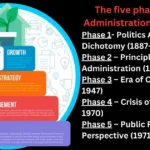Good governance is a fundamental principle that ensures effective and responsible decision-making in both public and private sectors. It encompasses a range of principles and practices that aim to create an environment of transparency, accountability, fairness, and participation. In this blog post, we will explore the concept of good governance, its significance in society, and the key principles that underpin it.
Defining Good Governance
Good governance is a concept that encompasses various principles and characteristics aimed at ensuring effective, transparent, accountable, and responsible administration. Here are five famous definitions of good governance:
- World Bank Definition:
The World Bank defines good governance as “the manner in which power is exercised in the management of a country’s economic and social resources for development.” This definition emphasizes the responsible use of power and resources for the overall development of a nation. - United Nations Development Programme (UNDP) Definition:
The UNDP defines good governance as “the exercise of economic, political, and administrative authority to manage a country’s affairs at all levels.” This definition underscores the need for effective management across different spheres of governance to achieve sustainable development. - The Commonwealth Secretariat’s Definition:
According to the Commonwealth Secretariat, good governance involves “the exercise of authority and control by a government in a manner that is legal, transparent, accountable, and responsive to the needs of the people.” This definition highlights the legal and responsive aspects of governance. - Amartya Sen’s Perspective:
Nobel laureate Amartya Sen emphasizes the role of participation and freedom in good governance. He sees good governance as “a system in which people have the capability to lead the kind of lives they have reason to value.” - Kofi Annan’s Principles:
Former United Nations Secretary-General Kofi Annan outlined four key principles of good governance: transparency, accountability, participation, and rule of law. He believed that adherence to these principles is essential for fostering a just and prosperous society.
These definitions collectively stress the importance of transparency, accountability, rule of law, participation, and effective management in the exercise of governmental authority for the benefit of society. Good governance refers to the efficient and effective management of resources, institutions, and processes to meet societal needs and aspirations. It involves establishing structures, mechanisms, and processes that promote ethical behavior, transparency, and accountability in decision-making.
Significance of Good Governance in Society
The significance of good governance in society cannot be overstated. It ensures that public resources are utilized optimally, promotes social and economic development, and fosters trust between governments and citizens. Good governance creates an environment conducive to the realization of human rights, the rule of law, and sustainable development.
Key Principles of Good Governance
Good governance is guided by a set of key principles that serve as the foundation for its successful implementation. These principles include transparency, accountability, participation, rule of law, fairness, and effectiveness. Each principle plays a crucial role in ensuring that governance practices are equitable, responsible, and responsive to the needs of society.
Transparency and Accountability in Good Governance
Transparency and accountability are two essential pillars of good governance. They promote openness, trust, and integrity in decision-making processes, enabling citizens to hold their leaders accountable.
Transparency as a Pillar of Good Governance

Open Decision-making Processes
In a transparent governance system, decision-making processes are open to public scrutiny. This includes making information about policies, laws, regulations, and administrative procedures easily accessible. By allowing citizens to understand and follow decision-making processes, transparency encourages their active participation and fosters trust in the system.
Access to Information and Data
Transparency also entails providing citizens with access to relevant information and data. This empowers individuals and civil society organizations to monitor government actions, demand accountability, and contribute meaningfully to the decision-making process.
Public Accountability Mechanisms
A transparent governance system includes robust mechanisms for public accountability. These mechanisms hold public officials accountable for their actions and ensure that they act in the best interest of the public. This includes measures such as financial audits, performance evaluations, and public hearings.
Accountability in Good Governance
Accountability is the process by which public officials and institutions are held responsible for their actions and decisions.
Holding Public Officials Responsible
Good governance requires mechanisms to hold public officials accountable for their actions. This includes effective systems of checks and balances, whistleblower protection, and legal frameworks that define ethical conduct.
Effective Oversight Systems
Accountability is reinforced by effective oversight systems that monitor the actions of public officials and institutions. This includes independent auditing bodies, ombudsmen, and parliamentary committees that scrutinize the use of public resources and ensure compliance with laws and regulations.
Combating Corruption and Ensuring Ethical Behavior
Transparency and accountability are crucial in combating corruption and promoting ethical behavior. By discouraging corrupt practices and creating a culture of integrity, good governance helps build trust among citizens and encourages the responsible use of resources.
Rule of Law and Fairness in Good Governance

Upholding the rule of law and ensuring fairness are fundamental aspects of good governance. They contribute to the establishment of just and equitable societies.
Upholding the Rule of Law
The Role of Legal Frameworks
The rule of law is the principle that states should be governed by clear and fair laws that apply equally to all individuals. Good governance requires the establishment of legal frameworks that protect human rights, ensure due process, and provide a basis for resolving disputes.
Independence of Judiciary
A key element in upholding the rule of law is the independence of the judiciary. An impartial and independent judiciary ensures that the rule of law is applied consistently and that citizens can seek redress when their rights are violated.
Promoting Equality and Justice
Fairness and justice are core principles of good governance. It entails promoting equality by addressing structural inequalities and ensuring that all citizens have equal access to opportunities, resources, and justice.
Fairness in Good Governance
Ensuring Equal Opportunities
Fair governance requires policies and practices that provide equal opportunities for all individuals, regardless of their socio-economic background, race, gender, or other characteristics. It aims to create a level playing field where everyone has an equal chance to succeed.
Nondiscrimination and Social Inclusion
Promoting fairness means eliminating all forms of discrimination and promoting social inclusion. Good governance ensures that marginalized and vulnerable groups have an equal voice in decision-making processes and that their rights are protected.
Just and Equitable Policies
Fair governance requires the formulation and implementation of just and equitable policies. This includes policies that address social and economic disparities, promote social welfare, and ensure the provision of basic services to all citizens.
Participatory Decision-making in Good Governance
Participatory decision-making is at the heart of good governance. It recognizes the value of citizen engagement in the policy-making process and promotes inclusive and collective decision-making.
Importance of Citizen Engagement
Inclusive and Participatory Processes
Citizen engagement is essential for good governance as it ensures that policies and decisions reflect the diverse needs and aspirations of the population. Inclusive and participatory processes empower citizens and enable them to contribute to shaping the future of their communities.
Strengthening Civil Society Organizations
Good governance relies on strong civil society organizations that represent the interests of citizens and hold governments accountable. These organizations play a crucial role in fostering citizen engagement, promoting transparency, and advocating for policy reforms.
Collective Decision-making
Participatory decision-making encourages collective decision-making processes that involve multiple stakeholders. By involving various perspectives, good governance seeks to reach decisions that are more inclusive, representative, and legitimate.
Enhancing Public Participation
Accessible and Open Public Forums
Good governance provides accessible and open public forums where citizens can voice their opinions, concerns, and aspirations. This includes town hall meetings, public consultations, and online platforms that facilitate dialogue between citizens and decision-makers.
Decentralization and Local Governance
Decentralization and local governance are tools for enhancing public participation and strengthening democratic processes. By devolving power and decision-making authority to local communities, good governance ensures that governance is closer to the people it serves.
Empowering Marginalized Communities
Participatory decision-making in good governance involves empowering marginalized communities and ensuring their active involvement in decision-making processes. This includes providing them with the necessary resources, information, and support to enable them to participate effectively.
Effectiveness and Efficiency in Good Governance

Efficiency and effectiveness are crucial aspects of good governance to ensure that resources are utilized optimally and public services are delivered in a timely and cost-effective manner.
Efficiency in Public Sector Services
Streamlined Administrative Processes
Efficiency in good governance requires streamlined administrative processes that minimize bureaucracy and red tape. This includes simplifying procedures, reducing unnecessary paperwork, and embracing digital technologies to improve service delivery.
Resource Allocation and Budgeting
Good governance entails effective resource allocation and budgeting processes that prioritize the needs of the population. It requires transparent and accountable mechanisms for allocating public resources and ensuring that they are used efficiently.
Performance Evaluation Mechanisms
Efficiency is reinforced by performance evaluation mechanisms that assess the effectiveness of government programs and services. This includes monitoring key performance indicators, conducting impact assessments, and fostering a culture of continuous improvement.
Enhancing Effectiveness in Governance
Clear Policy Formulation and Implementation
Good governance requires clear and coherent policy formulation and implementation processes. It entails setting strategic priorities, defining measurable objectives, and establishing robust mechanisms for monitoring and evaluating policy outcomes.
Enhancing Public Service Delivery
Efficiency and effectiveness in good governance are closely linked to the quality of public service delivery. This includes providing timely and accessible services, ensuring the competence and professionalism of public servants, and adopting innovative approaches to meet the changing needs of the population.
Continuous Monitoring and Improvement
Good governance embraces a culture of continuous monitoring and improvement. It involves regularly assessing the impact of policies and programs, soliciting feedback from citizens, and making necessary adjustments to improve governance practices.
People Also Read: Exploring Administrative Reforms in India: 1966 and 2005
Relevance of Good Governance in Today’s World

In today’s complex and interconnected world, good governance is more relevant than ever. It provides the necessary framework for addressing socio-economic challenges, fostering environmental sustainability, promoting peace and stability, and facilitating global cooperation.
Good Governance and Sustainable Development
Addressing Socioeconomic Challenges
Good governance addresses socio-economic challenges such as poverty, inequality, and unemployment. It ensures that resources are allocated effectively, policies are implemented efficiently, and services reach those who need them the most.
Example: In the Republic of Korea, the government implemented good governance practices contributing to its rapid economic development. Through transparent and accountable decision-making processes, the government effectively addressed socio-economic challenges and improved the quality of life for its citizens.
Fostering Environmental Sustainability
Environmental sustainability is a key aspect of good governance. It requires balancing economic development with the preservation of natural resources and ecosystems. Good governance promotes the adoption of environmentally friendly policies, the enforcement of environmental regulations, and the participation of citizens in sustainable development efforts.
Promoting Peace and Stability
Good governance plays a vital role in promoting peace and stability within and among nations. By ensuring the rule of law, effective institutions, and inclusive decision-making processes, good governance creates an environment conducive to conflict resolution, social cohesion, and peaceful coexistence.
Good Governance and Global Cooperation
International Institutions and Good Governance
Good governance is essential for global cooperation and the achievement of developmental goals. International institutions, such as the United Nations and the World Bank, promote good governance practices at both the national and international levels. They provide support, technical assistance, and knowledge sharing to help countries strengthen their governance systems.
Collaboration for Developmental Goals
Good governance is critical for achieving global developmental goals, such as the United Nations Sustainable Development Goals (SDGs). It requires collaboration and partnership among governments, civil society organizations, and the private sector to address global challenges such as poverty, hunger, climate change, and inequality.
Addressing Transnational Issues
Good governance is vital for addressing transnational issues that require coordinated action across borders. This includes addressing challenges such as terrorism, organized crime, migration, and public health crises. Effective governance systems and international cooperation are essential for tackling these complex issues.
Summary and Conclusion
Good governance is a concept that encompasses transparency, accountability, fairness, participation, rule of law, and effectiveness. It plays a vital role in ensuring efficient and responsible decision-making processes, promoting social and economic development, and fostering trust between governments and citizens. By upholding the principles of good governance, societies can address socio-economic challenges, promote environmental sustainability, foster peace and stability, and enhance global cooperation. Implementing good governance practices is crucial for achieving sustainable development and creating a better future for all.
Frequently Asked Questions (FAQs)
A. What is the relationship between good governance and democracy?
Good governance and democracy are closely interconnected. While democracy ensures citizens’ political participation and the protection of their rights, good governance provides the framework and principles for responsible and effective governance. Democracy and good governance reinforce each other by promoting transparency, accountability, and citizen engagement.
B. How can citizens contribute to promoting good governance?
Citizens can contribute to promoting good governance by actively engaging in decision-making processes, holding public officials accountable, and advocating for transparent and accountable governance practices. They can participate in public consultations, join civil society organizations, and exercise their democratic rights to vote and express their opinions.
C. What are some challenges in implementing good governance practices?
Implementing good governance practices can be challenging due to various factors. These include corruption, lack of political will, weak institutions, limited resources, and cultural barriers. Overcoming these challenges requires commitment from both governments and citizens, capacity-building efforts, and implementation of comprehensive governance reforms.
D. How does good governance impact economic development?
Good governance has a significant impact on economic development. It creates an environment that fosters private sector growth, attracts investments, promotes fair competition, and ensures transparent and accountable management of public resources. By establishing the rule of law and providing a stable and predictable business environment, good governance contributes to sustainable economic growth and poverty reduction.
E. Can good governance lead to social and political stability?
Yes, good governance can lead to social and political stability. By ensuring equity, justice, and inclusiveness, good governance addresses societal grievances and reduces social tensions. It promotes trust between governments and citizens, strengthens democratic institutions, and fosters a sense of ownership and belonging. Good governance creates an enabling environment for peace, stability, and social cohesion.
People Also Read: Public Administration and It’s Meaning, Definition, Features & Purpose












Very interesting and informative blog.